The Ultimate Guide to Sanxing: Gods of Three Stars
Sanxing is a Chinese word that refers to the Chinese Gods of good Luck. It literally means “three stars” and is often translated as “the three officials” or "the three-star deities." These Chinese Gods are believed to be in charge of bringing us good fortune, prosperity, and longevity in life.
In this article we will discuss who these Chinese Lucky Gods are, how they came about, what each one represents and why you should have a Fu Lu Shou statue on your desk at work!
Fu Xing, Lu Xing and Shou Xing, they stand for the highest priorities in Chinese life: Luck (Fu 福), Prosperity (Lu 禄) and Longevity (Shou 寿).
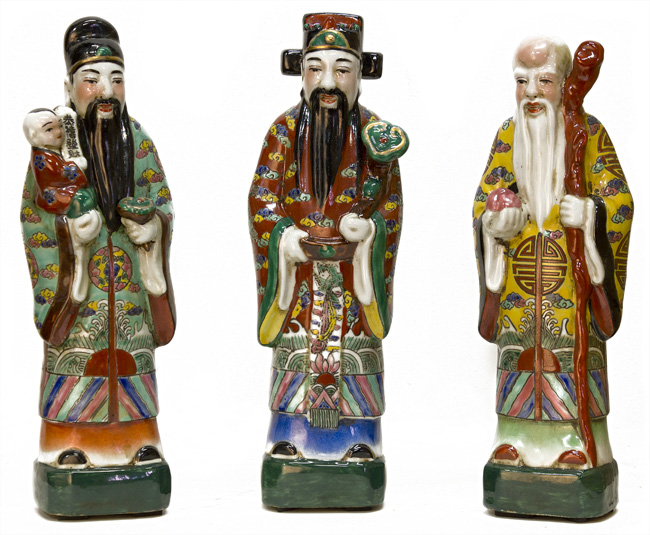
History of Sanxing
The three Chinese Lucky Gods, Fu Xing, Lu Xing and Shou Xing, have a long history in China. They originated from the Three Star Deities worshiped by the aboriginals of central China.
One fable recounts that a group of indigenous people who once lived in the central plains of ancient China witnessed three stars form a triangle in the night sky and believed that these stars were the homes of Chinese Gods. The Chinese people who subsequently moved to central China adopted this belief and eventually combined it with their own mythology, thus giving birth to three Chinese Lucky Gods.
The Three Star Deities are believed to have originated from Fu Xi 伏羲 (the divine ruler) or Nu Wa 女娲 (one of the Chinese creator Gods).
The Three Star Deities are often depicted in Chinese art as three bearded men dressed in silk embroidered robes.
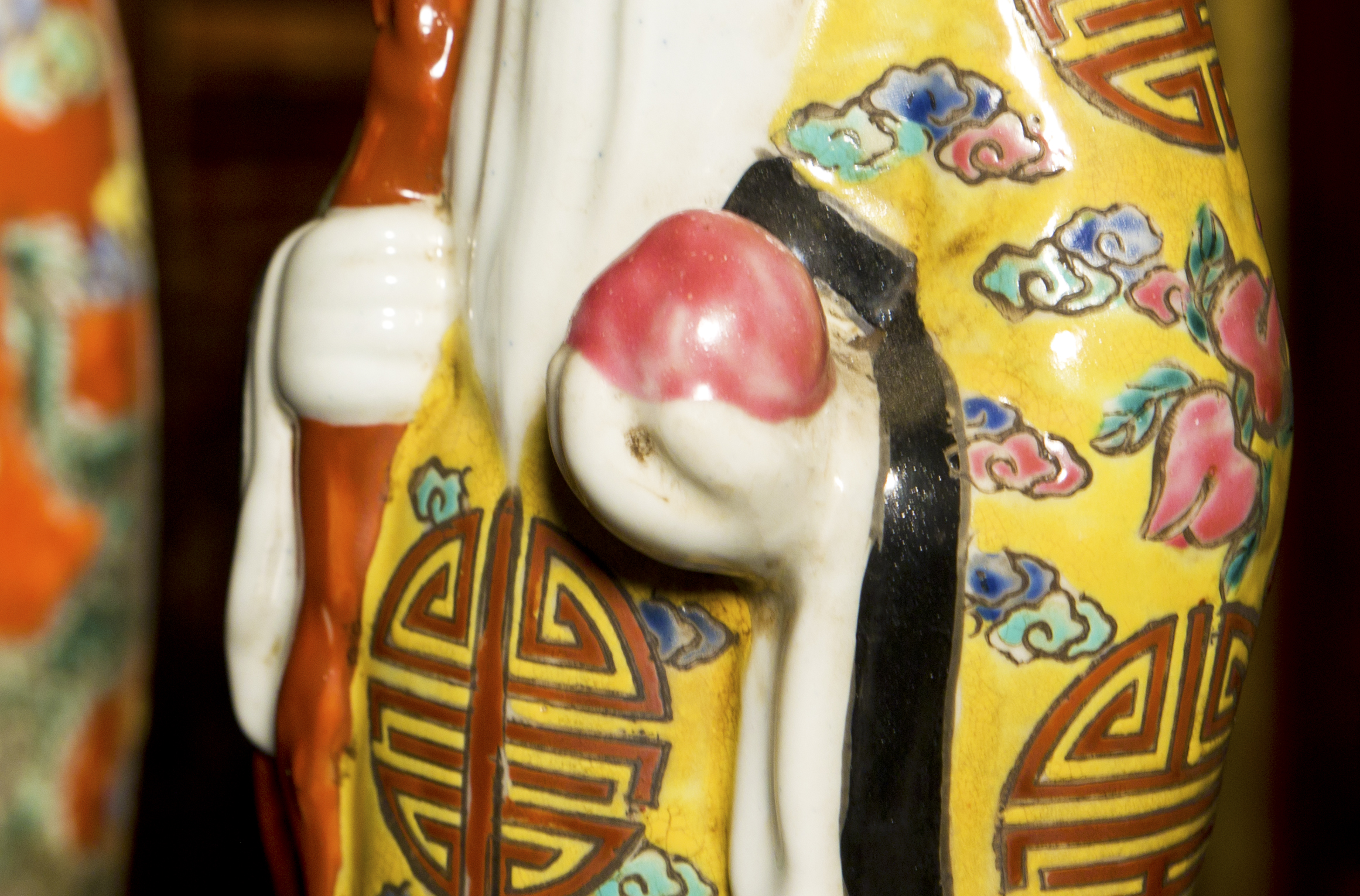
They are also portrayed each holding an iconic item unique to their auspiciousness: a baby for happiness, a ru yi or golden nugget (tong bao) for prosperity, and a peach of immortality for longevity).
Traditional Purpose: Fortune, Prosperity, and Longevity
The Chinese Lucky Gods, Fu Xing, Lu Xing and Shou Xing are Chinese good Luck symbols that have been worshiped for centuries. They bring fortune and prosperity to those who believe in them and can also be found as Fu Lu Shou idols on many Chinese restaurant walls.
These Chinese Lucky Gods were often displayed in wellness institutions, and seen at birthday parties as they are believed to help prolong a person’s lifespan!
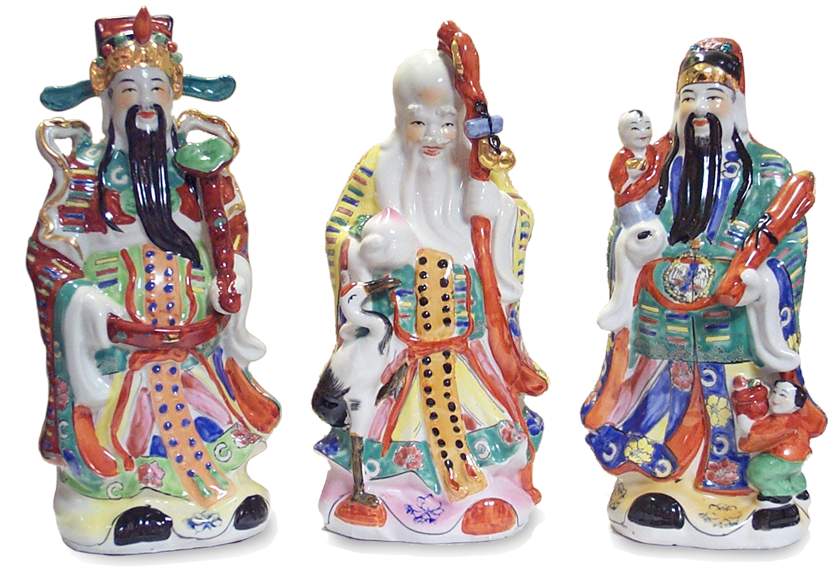
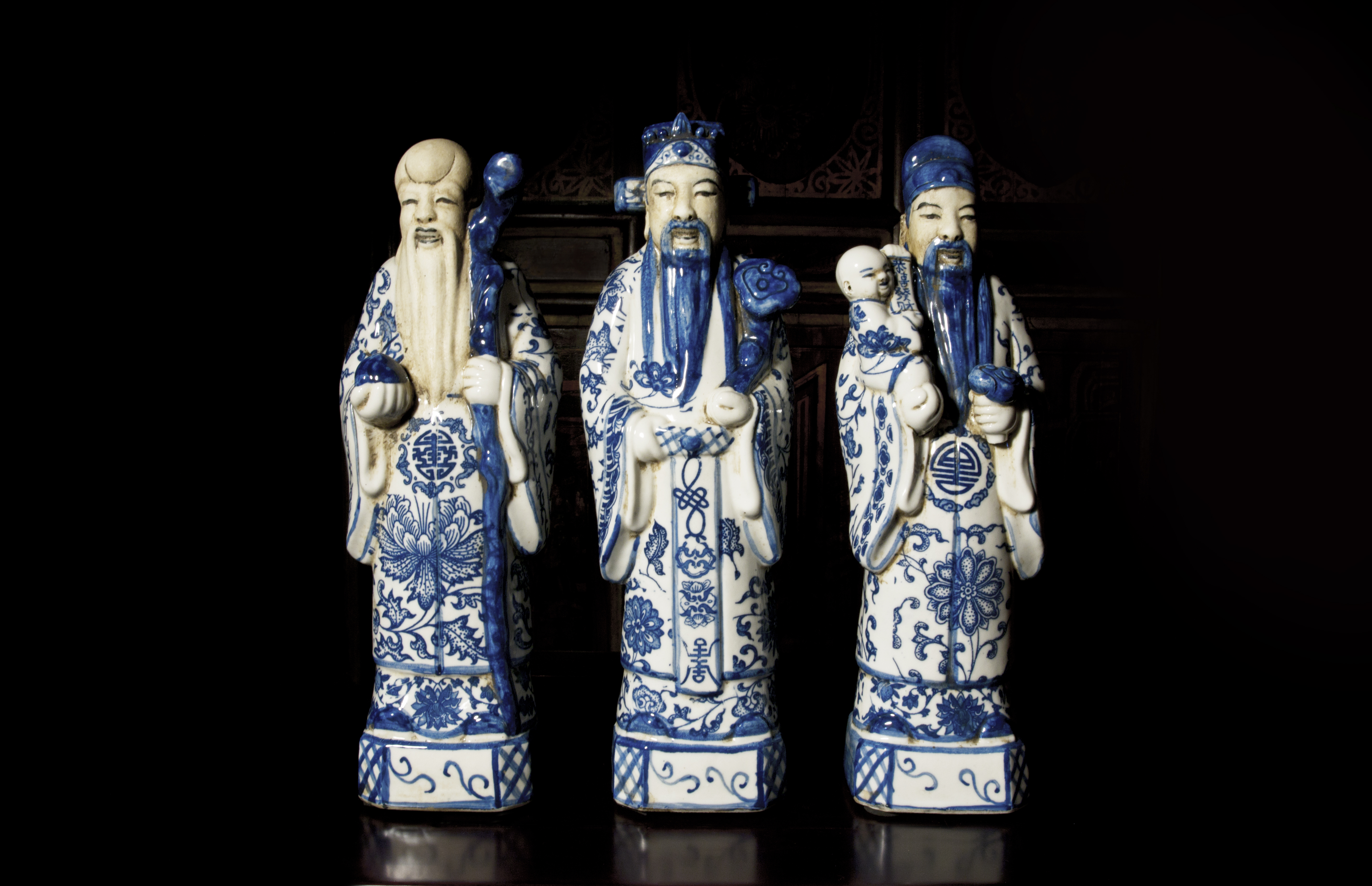
Sanxing Chinese Gods today
In China, the Chinese Lucky Gods are still worshiped and given offerings so that they will bring fortune to their followers. People often have a Fu Lu Shou idol made in order to show respect for these Chinese good Luck symbols.
In recent years, these Chinese Lucky Gods have also become popular in the west and can now be found in many Chinese restaurants, as well as in homes and businesses. It is also not uncommon to see each God displayed individually rather than in the group of three.
Why you should have a Fu Lu Shou statue
There are many reasons why you should have a Fu Lu Shou statue in your home or office.
Firstly, these Chinese good Luck symbols are believed to bring fortune and prosperity to their followers. They are also Chinese good Luck symbols that help prolong a person’s lifespan, thus giving them more time to enjoy life!
Secondly, Chinese good Luck symbols are believed to help protect people from Chinese evil spirits.
They can be displayed in institutions, homes or businesses as they are said to bring success and promote harmony between colleagues at work!
Lastly, Chinese Lucky Gods also make great Chinese gifts for occasions such as weddings, baby showers, birthdays or housewarming parties!
The Chinese Lucky Gods, Fu Xing, Lu Xing and Shou Xing are Chinese good Luck symbols that have been worshiped for centuries. They bring fortune and prosperity to those who believe in them and can also be found as Fu Lu Shou idols on many Chinese restaurant walls.
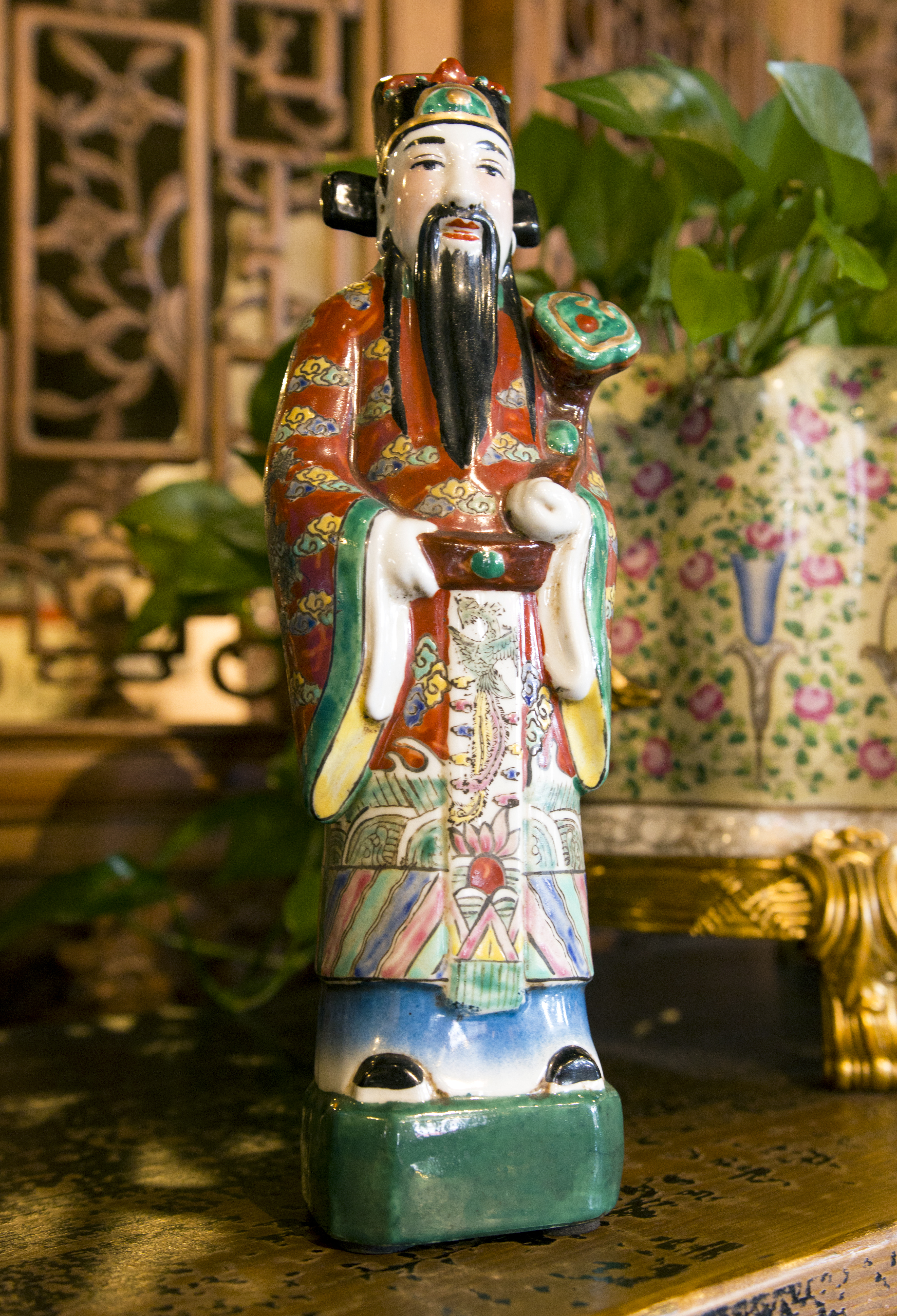
Contemporary Applications: Businesses, Homes, and Restaurants
In modern times these Chinese Lucky Gods also make Chinese good Luck symbols for businesses and homes as they are said to bring success, promote harmony between colleagues at work and protect people from evil Chinese spirits. Oftentimes, instead of the figures, the Chinese character symbols for each are displayed as decor.
These Chinese good Luck symbols are also popular Chinese gifts for occasions such as weddings, baby showers, birthdays or housewarming parties!
When placed together, Shou Xing (the Chinese God of longevity), usually stands in his position at the far left or far right while Fu Xing (the Chinese God of good fortune) and Lu Xing (the Chinese God of prosperity) are next to each other. The three Chinese idols are often found standing on one big pedestal. In recent years, these Chinese Lucky Gods have also become popular in the west and can now be found in many Chinese restaurants, as well as in homes and businesses.
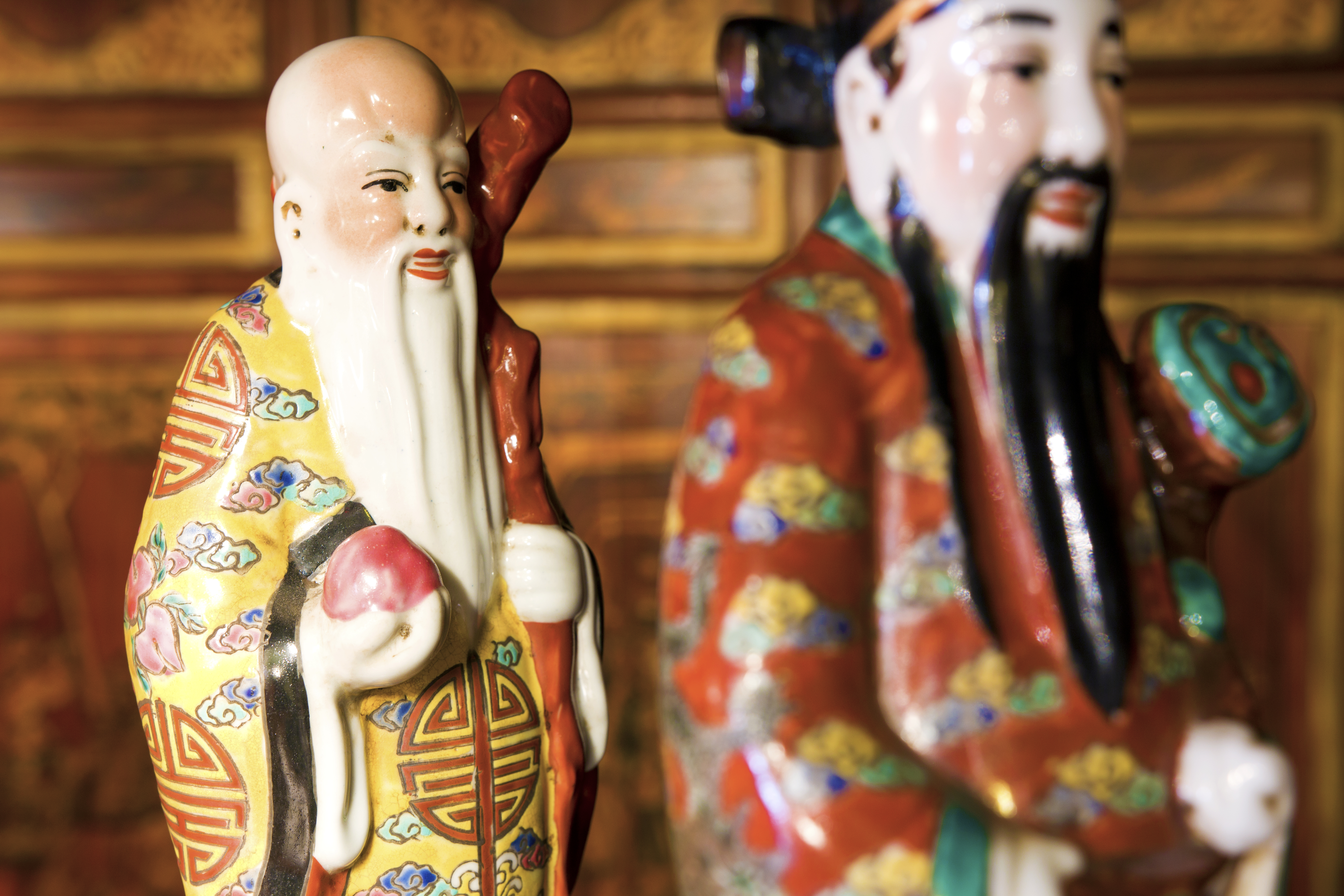
Possible Placement Areas for Best Feng Shui: Front Door, Office or Business
The three Chinese idols usually stand on one big pedestal, with the three Gods standing in their respective positions with the God of Longevity being on either the left or right end. Alternatively, they are also seen as: Fu Xing (the Chinese God of good fortune) on the left, Lu Xing (the Chinese God of prosperity) on the right and Shou Xing (the Chinese God of longevity) at the back.
The Chinese God of good fortune, Fu Xing is often found on the front door to bring good Luck and prosperity into businesses. The Chinese God of longevity and God of prosperity, Shou Xing and Lu Xing, respectively can also be placed separately, usually in the common areas of homes such as the living room, dining room, or kitchen. They are popular Chinese good Luck symbols for businesses and homes because they are said to bring success, promote harmony between colleagues at work and protect people from Chinese spirits.
All three Chinese Lucky Gods, Fu Xing, Lu Xing, and Shou Xing can be found in Chinese restaurants as they are believed to bring good luck and prosperity. These Chinese idols can be placed above the cash register or on the wall to promote a thriving business!
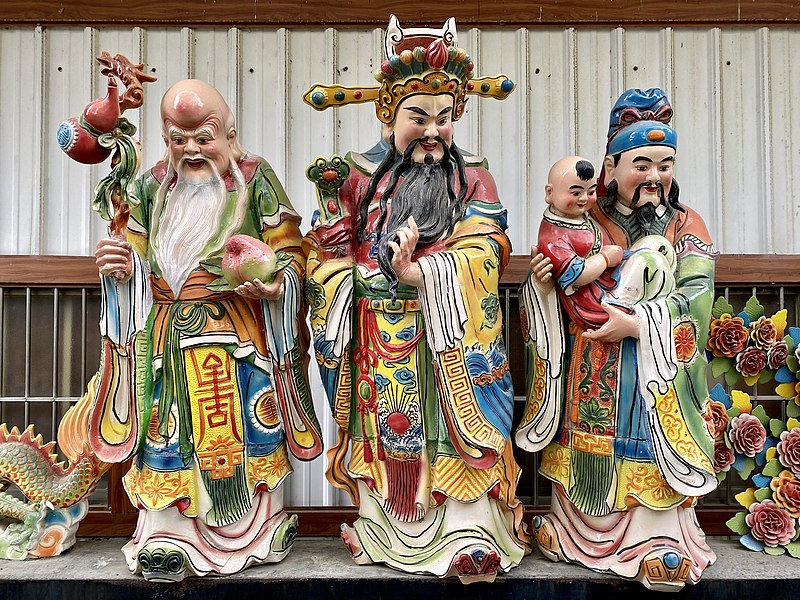



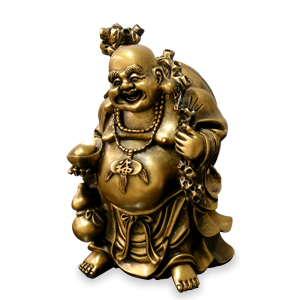
SocialMedia